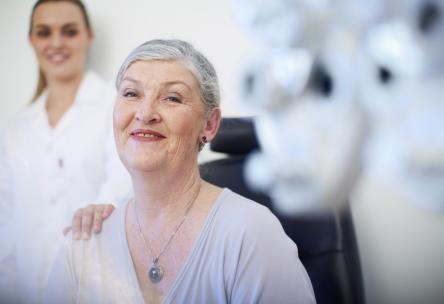Regular vision care can prevent further disorientation in dementia patients

Alzheimer’s and other forms of dementia are devastating for patients and their families. These progressive brain diseases cause memories and thinking skills to gradually disappear.
The Alzheimer’s Association estimates that 5.6 million Americans are living with the condition. That number is expected to climb to almost 14 million during the next 30 years.
Because 97 percent of Alzheimer’s patients are age 65 and older, many have to deal with other health issues that often come along with age—including vision problems.
“When vision gets worse, that can make comprehension even harder for someone with Alzheimer’s,” says Cynthia Collins, O.D., an optometrist at America's Best Contacts & Eyeglasses in North Myrtle Beach, South Carolina.
Staying on top of eye health issues often falls to family members and other caregivers. Catching the early signs that a loved one is having lapses in vision can go a long way toward protecting their sight. Here are some steps you can take to help.
Get an Annual Exam
The American Optometric Association recommends that everyone age 60 and older have an annual eye examination.
In a comprehensive exam, eye doctors typically depend on patient feedback. For instance, the doctor will try out various lens settings, as a patient looks at an eye chart featuring text of different sizes. The patient then tells the doctor which adjustments provide the best vision.
For an Alzheimer’s patient, this task may not be so easy. The patient may be confused by the process and not give a helpful response.
Still, the optometrist can get vital information by objective measures. “We have automated equipment that tests their eyes and gives a rough draft of what their prescription should be,” says Collins.
Through their examination, doctors can also tell how healthy the eyes are in general and look for indicators of other medical problems, such as heart disease, diabetes, and cancers.
Whether or not new glasses are needed, Collins advises ordering an extra pair because if the glasses get lost or broken, that can disrupt life’s routine and create more confusion for Alzheimer’s patients. They may want to avoid contacts as well—they can be harder to put in and take out, and are easily torn or lost.
Timing is Everything
As a caregiver, you want to schedule an eye exam at a time when the patient is at their best—in terms of clarity and mood. If there is a time and/or day when they are consistently awake and responsive, bring your loved one in at that time, suggests Collins.
Don’t be afraid to change your plans if your loved one just seems off. “If it’s not good day, reschedule the appointment so you can get a positive experience instead of a frustrating one,” she says.
If the patient seems to be going through a rough patch, there is probably no harm in waiting until they feel better. If a visit to the eye doctor is going to be very stressful, Collins suggests carefully weighing the pros and cons of making the trip. “Is the vision exam necessary now or is it better to keep the current quality of life intact?” she says.
Watch for Changes
Certain shifts in normal activities can be possible indications that an Alzheimer’s patient is experiencing difficulties with their sight.
The Alzheimer’s Society (a charity in the U.K.) urges caregivers to take note if a loved one is having difficulties recognizing people, coping in low or bright light, finding things, locating food on their plate, avoiding obstacles, or reading (the patient may be stuck on one page of a book for an abnormally long time).
Although all of these issues may be brought on by dementia, a visit to the eye doctor is worth it to check if vision troubles might be the cause. Any improvements in sight may help reduce the confusion triggered by Alzheimer’s disease.
“Since age is the greatest risk factor associated with Alzheimer’s, it may be difficult to determine initially if vision problems are a direct result of Alzheimer’s, another dementia, or more common age-related vision problems,” says Monica Moreno, senior director of Care and Support at the Alzheimer's Association. “It is important to see a physician to determine the cause so that age-related changes can be corrected or mitigated, while those associated with Alzheimer’s or another dementia can be managed appropriately.“
Make Adjustments
While eye exams may help Alzheimer’s patients with sight problems, caregivers can make other changes around the home that may make seeing easier. These modifications, recommended by the Alzheimer’s Association, can keep individuals safer as well.
- Add extra lights to entries, doorways, stairways, areas between rooms, and bathrooms.
- Use night lights in hallways, bedrooms, and bathrooms to prevent accidents and reduce disorientation.
- Remove objects—such as magazine racks, coffee tables, and floor lamps—as those might prove to be tripping hazards for a person with declining vision.
As senses diminish with age, caregivers can bolster senior sight by buying them books with large print and devices with bigger buttons. Bright colors may help as well.
“Brighter colors are generally a good idea because cataracts may develop in older adults, making colors appear dimmer and weaker,” says Collins.
The more caregivers can do to help loved ones see better, the more connected and engaged they will be in the world.


